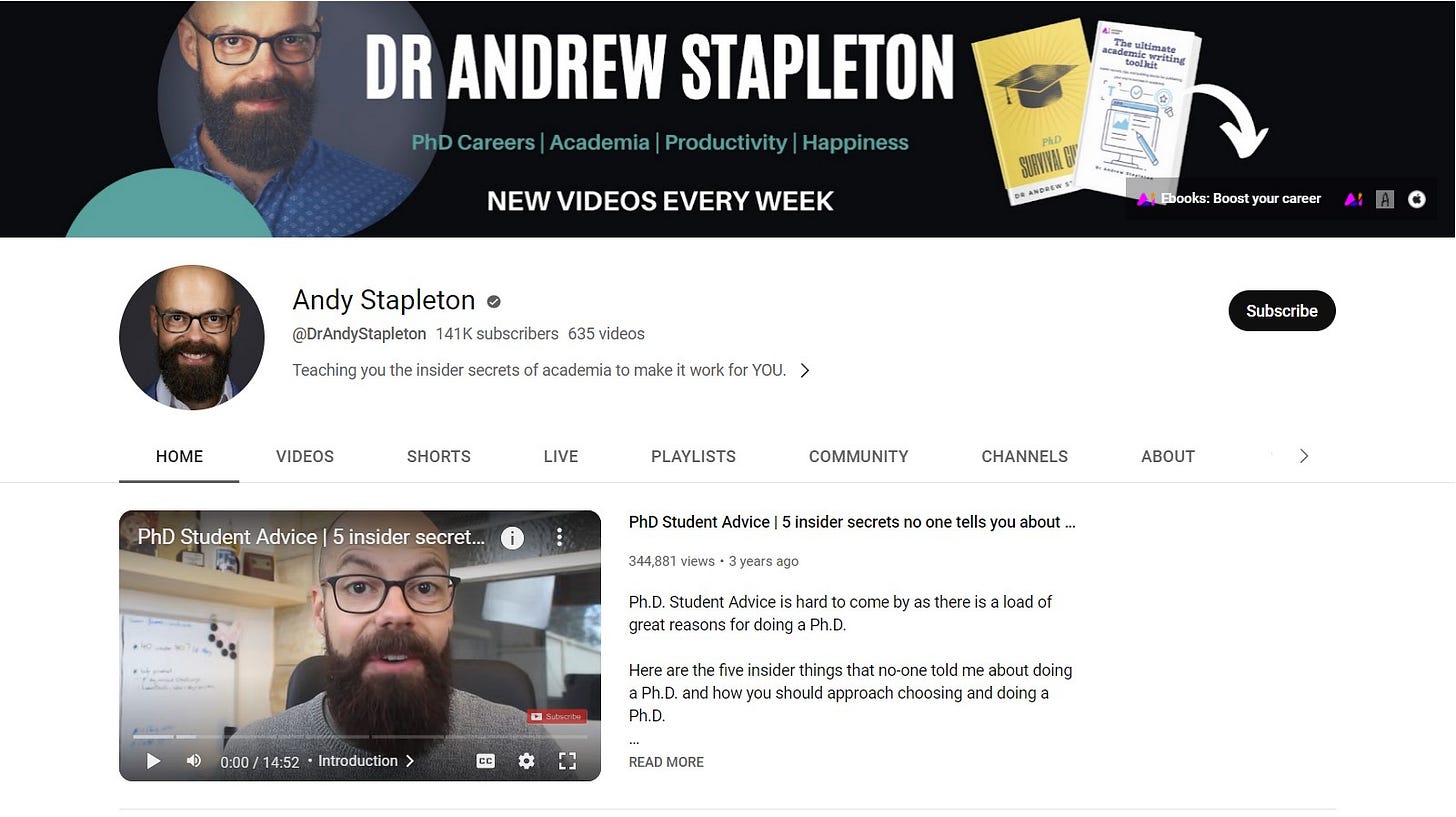Why I Quit the PhD Route Before I Even Started
A guest post from a student mentee reflecting on their struggle finding degree-relevant work and a review of contemporary problems degrading academia.
Note to readers: this guest post, written by an undergraduate student who reached out to me for research mentorship and academic guidance, has been intentionally left anonymous at the student’s request.
In high school I developed the notion that I needed to have a concrete career plan before I went to college. It was important for me to go to a good school, and while my grades were decent, they were not at the level to go to a top college. I decided to specialize in an area to make myself a ‘pointy’ applicant, someone who is passionate about one or a two unique interests rather than someone who is well rounded in many. I decided I would try to focus on studying psychology. It was a subject I was genuinely passionate about that was also an opportunity to do some good helping other people. I was fascinated by the research side of psychology and was encouraged by one of my teachers to explore teaching at the college level. It became my mission in my junior year of high school to earn a PhD in psychology.
When I was enrolled in college, I immediately declared my major as psychology. I was advised to gain as much research experience as possible as an undergraduate, and it took me five years to graduate, but during my college education I worked full-time for a year and a half at some of the world’s leading research institutions such as Mass General and Boston Children’s Hospital. I graduated summa cum laude and thought I was well on my way to earning a PhD and would my have pick for a research assistant position, a now required two-year job to gain research experience before applying to PhD programs. A year and around 50 applications later, I remain unemployed in the field of psychological research.
Why has it been so difficult for me to find gainful employment in this job market, despite a good resume? It probably comes down to a complicated set of factors. First, the field is highly competitive, much more so than I realized. There are hundreds of bright students out there, all with solid resumes like mine, competing for a limited number of jobs. As a previous guest author has pointed out, many of these temporary, entry-level positions are being taken by people with master’s degrees. Additionally, it was difficult to build my resume with meaningful skills. At my internships, there were many jobs for bureaucratic reasons I was not able to do. Jobs like administering basic psychometrics to children or walking a patient through an MRI session. These jobs do not require superlative cognitive abilities or even much prior knowledge. Many of the research assistants working in these positions only received training after they had been hired and are able to complete these jobs with ease and efficiency in a short period of time. I was unable to do these tasks usually because I was a temporary employee (even though my internships were set to last 6-months) and because I did not have a bachelors degree. After having completed one, I can confidently say that none of the further classes I took would have had an impact on my competencies in these areas.
I made no money on any of my internships, and I assumed I would be paid in experience, training, and name recognition of the institution which I could use to apply for a research assistant role anywhere I wanted. In retrospect, I feel like I was exploited. The main skills I gained my internships were professionalism and organization which I could have learned at any job. I kept being told that I should feel lucky to be working at such prestigious institutions. I realize now that prestige and influence are only as good as the experience to back them up. I should not have been so mesmerized by the promise of working at an elite institution and instead should have focused on building a repertoire of valuable skills.
I suspect that, if I really wanted to, I could have submitted more applications, lowered my standards for a job, expanded my repertoire of skills, and probably found a decent research assistant job. I think there were always some doubts about the path I was on that were holding me back from giving 100% of my effort towards advancing my career and education down this lane. None of the people I had worked with seemed happy and many even told me if I could do something else with my time, it would be better for my sanity and my wallet. I stubbornly ignored the increasing number of warning signs: the long hours, the tense atmosphere, and the exhausted people. I had always assumed with little extra intelligence and elbow grease that I would be able to complete a program and find a job where I felt satisfied. What pushed me over the edge was when I started watching videos from a YouTube channel run by a former professor named Andy Stapleton. He has fantastic insider advice on academia and the PhD process and I highly recommend his content to anyone working their way along the chain of entry into academia. I had only an inkling of the ruthlessness and viciousness of workplace politics at the university, but Dr. Stapleton helped open my eyes to the reality of the situation.
More than half of the people in academia are not satisfied with their jobs. Academia is even cited as essentially being run like a drug cartel. There are a limited number of paying positions with good salaries that everyone is competing for. Funding is limited and highly sought after. There is immense pressure to constantly publish new research or you risk falling behind on your paper quotas. Fewer papers means a lower chance of being granted funding. Less grant money means fewer papers, and so on and so on. To avoid falling into this vicious cycle, people often engage in unethical behavior, even going so far as to pay to have their names appear on papers. Everyone who is not a tenured professor is being abused to some degree. Often post-doctoral students do most of the work for little to no pay. The unstable work environment rewards rubbing shoulders with and brown nosing the right people, rather than being a competent researcher. It is not enough to be merely smart and organized when there might be hundreds of eminently qualified people also competing for your position and your funding.
Frighteningly, people with average political views cannot survive in the current academic environment. I am sure readers of the Multilevel Mailer are well aware of the inexorable shift in culture of academia to an extreme left-leaning political ecosystem. You simply cannot advance in this job market if you are moderate, apolitical, or God forbid right-wing. By choosing not to engage in politics, you open yourself to accusations from true-believer activists and cynical careerists of standing in the way of ‘progress’. You must be actively one-upping your colleagues with the newest social tech in the form of increasingly ridiculous woke platitudes to stay morally superior to your colleagues. Academic psychology is ground-zero for some of the most ludicrously radical left-wing ideas and most ridiculous standards of normalized DEI culture. I always knew this was going to be an issue going into the field, even as early as high school, but over the last few years, DEI has permeated and intensified through all levels of academia to the point where being a left-wing activist is essentially a job requirement.
There was a part of me that knew about these issues but did not acknowledge them consciously. I did not want the reality of the situation to stop me from pursuing my dream job of asking important question, advancing the field of science, and working on complicated problems. It was difficult to wake up to the state of affairs I was finding myself in, but the new path I am going to take is one where I do not feel the same sense of dread and anxiety. Instead of pursuing a PhD, I am instead going to pursue a PsyD degree. A PsyD is a four-year graduate degree that allows you to call yourself a psychologist, practice therapy, and administer psychometric tests. This last point is significant as there is a fast growing job market in this area. PsyD programs are easier to get into than PhD programs as masters degree programs are big money makers for schools and there are many more spots available. While it is more expensive than doing a PhD, a PsyD takes half the time than it would to obtain a PhD if you include the research assistant position as part of the PhD process. While I will not be able to do research, there are plenty of other fulfilling opportunities this degree allows for. I still have to go through higher education and deal with the politicized culture, but I will have more distance from it as a student rather than as an pseudo-employee like a graduate student would be.
Before I decided to switch paths, I was not looking forward to the future of my professional career. I saw myself spending the best years of my life working for people who would squeeze every bit of vitality out of me. I saw myself constantly self-censoring and walking on eggshells constantly around even the most banal issues. For the first time in a while, I feel excited about the future of my career. It may seem like I am complaining about sour grapes, but I truly feel more relieved and at peace working towards my new career goals. I am still passionate about psychology and about helping people. I only wish I had realized what I truly wanted sooner. The main lessons I have learned from this whole job situation is to be honest with yourself, to not commit to anything too quickly, and to assess the situation as it is, not how you wish it would be.




